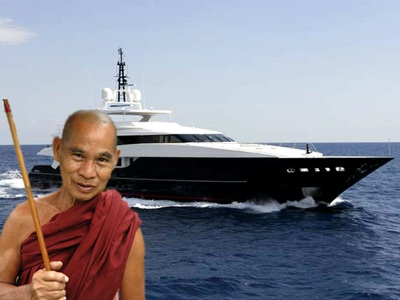Being the writer of Buddha Buzz blog posts certainly has its advantages. For one, I get to spend my time reading and writing about subjects that are important to me. But the main advantage by far is that during the time I spend scouring the Internet each week for Buddhist-related news, I’m often (or so I like to think) one of the first people to be alerted when something really, really awesome—and Buddhist—goes on sale. Like this $28.5 million yacht.
Just for some context, I sprained my ankle just last month trying to step over the massive hill of money that lies on the floor of my bedroom and prevents me from getting into bed without revving up a good amount of speed and vaulting over it (a tragic story, I know). I’ve agonized over what to do with this money. Put it in the bank? Invest it in the stock market? Leave it where it lies and take weekly baths within its gentle green folds? Luckily for me, the answer of my dreams floated down to me this week in the form of this ad on Business Insider: “YACHT OF THE WEEK: This Zen-Inspired Yacht Will Help You Gain Inner Peace For Just $28.5 Million” The ad begins, “Some might think that sitting on the deck of a luxury yacht would be enough to achieve complete inner peace. But to be truly centered, you actually need a yacht that carries the theme throughout the ship.” Right…
Here’s the ad photo:

Oh yes, I see now…the purchase of this $28.5 million yacht will make me just as happy as that smiling monk in the corner
Okay, okay, enough with the snarkiness. Sometimes I just can’t help myself. (Also, I hope everyone knows that I don’t really have a pile of money lying on the floor of my bedroom.)
In much more important Buddhist news this week, Tibetan self-immolations have spread out of Tibet and into India, where a young Tibetan in New Delhi lit himself on fire four days ago to protest Chinese President Hu Jintao’s visit to India. Reports from India say that the police have shut down Tibetan neighborhoods and are lining the streets equipped with soaking blankets.

Jamphel Yeshi runs aflame in New Delhi on Monday. He has since died from his injuries.
In the meantime, while the Chinese government releases statements calling the Dalai Lama “a tricky liar skilled in double-dealing” and likening his “policies” to Hitler’s treatment of Jewish people during the Holocaust, the Dalai Lama has been busy winning the Templeton Prize for his work on the intersections between science and religion. The $1.7 million award, which according to the Washington Post is the “world’s largest annual monetary award given to a single individual,” will be presented to the Dalai Lama in May. Here’s his acceptance video—in typical Dalai Lama fashion, he’s modest and cheerful about the honor.
Next on this week’s list is the article “Enjoying Orientalism,” published on The Awl. The piece explores the illusions of Orientalism in context of journalism and economics and in wake of the allegations that Mike Daisy, a staunch protestor of Apple factory conditions of China, has been making up stories. Head on over to The Awl to read the full article, but I’ll give you a little taster here. The author begins:
So even now, there are two kinds of fantasies of Asia among Americans: the dream-Asia of our desires, the aestheticized and romanticized Asia, and then the nightmare Asia of our prejudices and fears, the Michael Crichton-inflected fear that They’re Taking Over The World.
And ends,
So it seems that the Mike Daisey debacle comes at an opportune time. We in the U.S. can no longer afford to treat China as distant or foreign; the Chinese are our partners, and our destinies are inextricably linked. We could—we should do everything in our power to make common cause with them. Only an understanding between our two nations as to how to manage the two economies in tandem, how to develop and use more sustainable forms of energy, and so on, can ensure that we all don’t just go up in flames. (…)
We can broaden our understanding of Asia the same way we understand the fantasies surrounding America and Americans, e.g. we are fat, noisy and wearing Bermuda shorts, or we are ignorant imperialist gun-totin’ vigilantes, or we all very glamorous and hang around with movie stars by the pool. Some little part of it is true, sometimes, but what we need is to be understood how we really are, as a complex and diverse people. China is the same. All we need to do is draw a line where illusion ends and reality begins. (And pay close attention when we spend money, and when we vote.)
And just in case none of these items are doing it for you, Tsoknyi Rinpoche had a nice, short dharma talk published in the Huffington Post this week called “Who Do You Think You Are?” He writes,
Our lives are so complex that we find ourselves playing different roles in different situations. We’re parents… children… employees… bosses… lovers… loners… counselors… seekers. Sometimes the sheer complexity of switching between all the different roles we have to play throughout the day becomes overwhelming and we find ourselves momentarily confused, genuinely wondering, ‘Who am I?’
Although it may initially seem distressing, we can learn to appreciate such moments of confusion, to consider each one as a gift—a break from the rigidity and routine that all too often creeps into our daily lives, robbing us of the openness, spontaneity and creativity that characterize the essence of our being.
Until next week!
Thank you for subscribing to Tricycle! As a nonprofit, we depend on readers like you to keep Buddhist teachings and practices widely available.